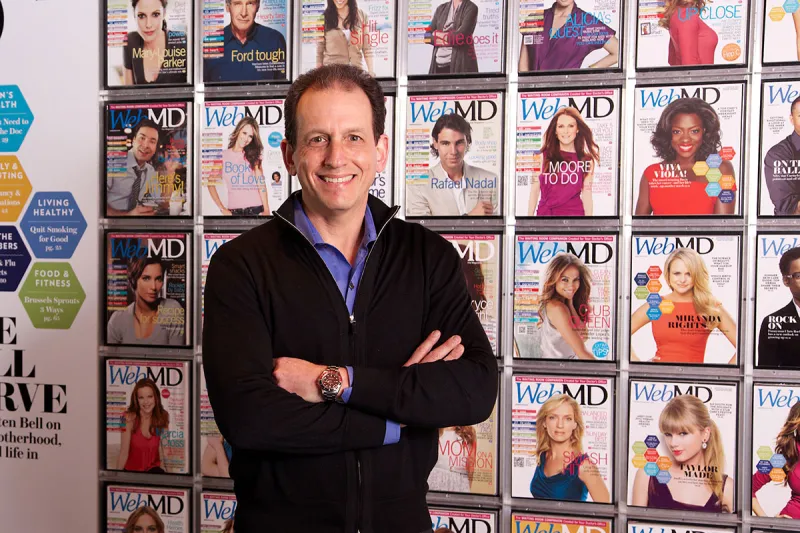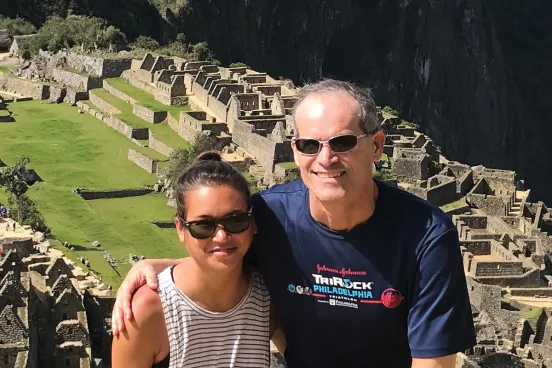
When David Schlanger was an undergrad trying to decide between pursuing an MBA or JD, he met a man at a job fair who recommended the latter. “He told me that law is the better education, and that it gives you more flexibility,” Schlanger recalls.
He took the advice and never looked back. “I went to law school not even knowing if I wanted to be a lawyer,” says Schlanger, now the CEO of WebMD. “But I knew it would be an education that would serve me well. I think not enough students realize that a law degree is such an advantage in the business world.”
Schlanger did indeed begin his career as a lawyer—as an associate working on corporate finance and mergers and acquisitions at Latham & Watkins. As a result of the network he built there, a new opportunity arose: One client suggested that the chairman of his company speak with Schlanger. “[The chairman] said to me, ‘You don’t want to be a lawyer at a law firm anymore; come to the business side.’ I went to the managing partner at the firm, and he said I could come back to the firm after a year or two if I wanted.
“But here I am, 25 years later, still on the business side,” Schlanger says.
Schlanger began at Medco Containment Services, where he was vice president of acquisitions. He followed that with a stint at Merck as executive director of business development, then more than six years as senior vice president for corporate development at Synetic Inc.—a company that was part of Medical Manager Corp., with which WebMD merged.
In 2001, he began working at WebMD, first as senior vice president for corporate development and later for strategic development as well. In those roles, he structured, negotiated, and managed key strategic partnerships with WebMD’s major media partners, customers such as Bausch & Lomb and Pfizer, and technology and content partners. He also played a key role in the launch of new businesses, including WebMD the Magazine—a publication widely distributed to physician waiting rooms—and WebMD in the United Kingdom.
“In those positions, I developed the management skills and expertise that allowed me to assume a greater management role at the company,” Schlanger says.
In 2013, Schlanger was named CEO of the company, a network that consists of owned and operated websites and applications for consumers and healthcare professionals. WebMD ranks No. 1 in the health information category for unique visitors on both desktop and mobile. WebMD’s health network is visited by approximately 70 million unique users per month in the United States and its site for healthcare professionals, Medscape, has approximately two million active physician members worldwide. The company’s annual revenues were approximately $580 million in 2014.
Strong numbers, but Schlanger has his sights set on growing the company much more. “There’s no such thing as standing still,” he says. “Health care is really undergoing transformational change. Digital healthcare technology is growing rapidly; healthcare is the last industry that isn’t very digital, but it’s going to catch up and it’s going to catch up quickly. And the whole notion of who is financially responsible for health care is undergoing radical change. We see a lot of opportunities for growth.”
One big area of growth: WebMD is developing a service in which patients will be able to access all of their health records in one place. “A collaborative care record will become something we’ll be able to provide that will help people make better health care decisions. We foresee WebMD as the single place where people manage all of their health care.
“Once you build those digital bridges, and your physician can help you manage your health care throughout the course of the year, you’re going to get much better outcomes,” he says. “After all, it really is your health, your life, your body; you need to be in control of your data. It’s about you.”
At many stages of his career, including as CEO, his legal training has been tremendously beneficial, he says. His understanding of issues such as consumer privacy, pharmaceutical industry advertising, and the key terms to focus on when making acquisitions of other companies is aided by the depth and breadth of his legal knowledge, he says. “Having been on the legal side of transactions makes it easier for me to understand them than it may be for other people,” he says.
“I also know that my education at Michigan Law School allowed me to establish the connections that were necessary to developing the career I’ve had,” he adds.
Schlanger began his undergraduate education at U-M but switched to Georgetown. Then, he says, “I missed Ann Arbor and the emotional connection I had with the University. I didn’t know what I had the first time I was there.”
His return to U-M for law school proved to be a good one, personally as well as professionally. “I met my wife when I was a 1L and got married after my 2L year,” he says. His wife, Lori, studied nursing at U-M (BSN ’82), and her parents and sister also attended the University. The Schlangers have three children who grew up visiting Ann Arbor often.
“When it came time for college, none of them would even consider going anywhere other than the University of Michigan,” he says. “All five of us have Michigan degrees. It’s a pretty powerful experience when you sit in the stadium and see your children graduate from the same place you did, and where you all have the emotional connection.”







